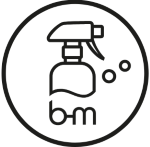
Rust remover
What you’ll need
- Citric Acid
- Container/ Bowl for mixing
- Sponge, Magic Sponge or Potbrush
- Hot water
Method
- Start by preparing a thick, spreadable paste by mixing some Citric Acid with a small amount of hot water.
- Apply the paste to the affected area and let it sit for at least 30 minutes or overnight to break down the particles.
- Gently scrub the area to remove the rust and rinse with water to eliminate any residue.
- Repeat the process if needed.
Use for:
Remove rust

Electronic Screens:
Phones, laptops, tablets, televisions, etc., all come with a protective coating to reduce smudges. Citric Acid can break down this layer, revealing the layers meant to be protected.

Sealed Wood:
Citric Acid can degrade the wax sealant, causing the protective layer to break
down and leaving a cloudy appearance. It also makes the surface more susceptible to further damage.

Natural Stone:
Citric Acid can etch or pit stone, granite, marble, and quartz surfaces so it should never be used to clean natural stone surfaces. The enzymes in Citric Acid will break down the delicate surface layer of these materials, corroding slowly over time.
Since this is a homemade recipe, this paste doesn’t have added ingredients to prevent clumping or drying out. It is best to use it up in one setting.
Store Citric Acid sealed tightly, in a cool, dry place, out of reach of children and pets.
Avoid breathing in Citric Acid as it can cause upper respiratory symptoms, always measure out the Citric Acid powder in a well-ventilated area. Whilst Citric acid is found in food items in a small quantity as a preservative if large amounts of Citric Acid are ingested it could cause nausea, vomiting, and diarrhoea.
Citric Acid can irritate your eyes and skin. Take care not to spill the powder and wear rubber gloves when working with this substance.

B&M Pro-Tip:
Use any leftover solution to descale your toilet.
